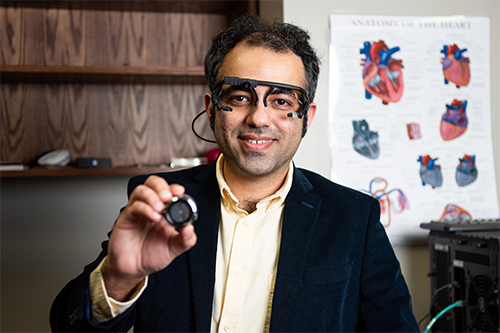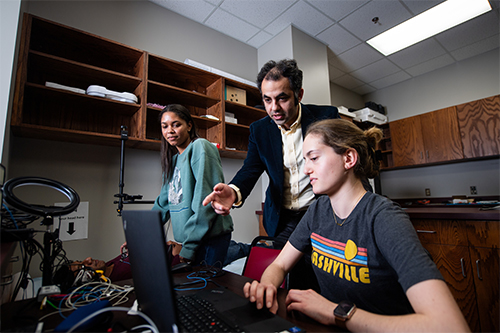Contact: Aspen Harris

STARKVILLE, Miss.—A Mississippi State University researcher is developing new, more affordable methods for early detection and monitoring of cardiovascular disease, the leading cause of death in the U.S.
Amirtahà Taebi, assistant professor of biomedical engineering, is using the human body’s vibrations to develop noninvasive diagnosis methods for cardiovascular disease using smartphones and low-cost sensors with a focus on health equity in the Taebi Lab at MSU. Work in the lab is directed toward low-income populations and underrepresented minorities, those usually more affected.
“One American dies from a cardiovascular disease every 34 seconds,” Taebi said. “If you place your hand on your chest, you will feel vibrations as a result of your heart pumping blood to different organs in your body. We can measure those vibrations using sensors.”
The lab is studying these cardiovascular-induced vibrations to see what cardiovascular events are represented by each vibration waveform.
He said that by analyzing the heart’s vibrations, his team aims to address questions regarding heart function and detect any signs of cardiovascular disease in people who may need medical attention.
The ultimate goal of Taebi and his team is to reduce mortality rates, optimize medical therapy, reduce hospital stays and improve the lives of patients.

In an effort to improve health equity, the lab is developing a more accessible method for cardiovascular activity monitoring through a smartphone app. Another project involves creating a low-cost heart monitor that individuals can keep at home to monitor different aspects of cardiovascular activities, including the electrical and mechanical aspects, blood oxygen levels and heart sounds.
“Mississippi has the second highest mortality rate in the country from congenital heart diseases, for example,” Taebi said. “That’s why we want to create methods that are accessible, low-cost and widely available to the general public for cardiovascular monitoring, so even those in rural areas and low-income individuals can afford to use these devices to monitor their own or their loved one’s cardiovascular activity. If something is wrong, they can know as soon as possible and see a doctor to determine their next steps.”
Before joining MSU in 2021, Taebi completed his postdoctoral fellowship in the biomedical engineering department at the University of California, Davis. He received a doctorate in mechanical engineering from the University of Central Florida, a master’s in biomedical engineering at Politecnico di Milano in Italy and a bachelor’s in mechanical engineering from Sharif University of Technology in Iran.
For more on MSU’s Department of Agricultural and Biological Engineering, visit www.abe.msstate.edu/.
Mississippi State University is taking care of what matters. Learn more at www.msstate.edu.